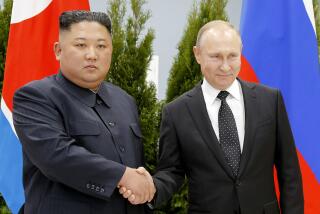Chile appears set to elect a conservative
As Chileans vote today for the first time since the death of dictator Augusto Pinochet, analysts say the expected victory of a conservative billionaire says more about voters’ craving for better education and infrastructure than a return to authoritarian days.
Sebastian Pinera, a Harvard-educated economist who owns a TV station, a soccer team and a chunk of the LAN-Chile airline, is projected to get the highest number of votes but probably not the 50%+1 he needs to avoid a runoff.
Pinera faces former President Eduardo Frei, the standard-bearer of the ruling Concertacion coalition, and Socialist lawmaker Marco Enriquez-Ominami in his bid to succeed highly popular President Michelle Bachelet, who is barred by the constitution from seeking reelection.
Although a generation has passed since Pinochet was in power, signs of public loathing are still evident. Eight thousand supporters and mourners turned out for the reburial this month of the remains of Victor Jara, a popular folk singer who was tortured and killed by Pinochet’s regime shortly after the 1973 coup that toppled leftist President Salvador Allende.
Pinera’s past support of the former dictator hasn’t overshadowed his appeal. In a video circulating recently on YouTube, he is seen condemning Pinochet’s arrest in Britain in 1998. But his appeal lies in his success as an entrepreneur and in campaign promises to streamline bureaucracy, boost high-tech education, spend more on public works and industrialize the economy.
New York University political scientist Patricio Navia said some of Pinera’s views, including advocacy of gay rights and a willingness to participate in an “abortion dialogue,” doesn’t fit the mold for most conservative politicians. Abortion is outlawed in Chile, and Bachelet’s support for a “morning after” pill has run into opposition.
“The media always compare him to [Italian Prime Minister Silvio] Berlusconi, but you could just as easily make the case he’s a Chilean Michael Bloomberg,” Navia said, a reference to the moderate Republican mayor of New York. “He’s essentially promising to do the same as the center-left coalition but with more efficiency and less corruption.”
The CERC public opinion firm predicted that Pinera would win 44.1% of the vote, followed by Frei, with 31%, and Enriquez-Ominami, with 17.7%.
Bachelet, a pediatrician who is limited to one four-year term, enjoys a 79% approval rating. The public appreciates her social programs, including housing subsidies for thousands of new homeowners as well as pensions for homemakers.
But her Concertacion coalition, which has been in power since democracy was reinstated in 1990, seems to have run out of ideas. Navia said many economists agree that the current economic model based on exports of fresh food, wine and natural resources has run its course.
After leading South American nations in economic growth through much of the 1990s and this decade on the strength of trade, Chile was hit hard by the global crisis and the collapse in commodity prices. Brazil and Peru will post stronger recoveries next year, according to a recent United Nations forecast.
“Chile will remain a globalized country, but to grow more it’s not sufficient to sell just wine, fish and copper to the world. It has to add value to its exports,” Navia said. “That’s what Pinera has been telling voters, that it must industrialize.”
Kraul is a special correspondent.
More to Read
Start your day right
Sign up for Essential California for news, features and recommendations from the L.A. Times and beyond in your inbox six days a week.
You may occasionally receive promotional content from the Los Angeles Times.






